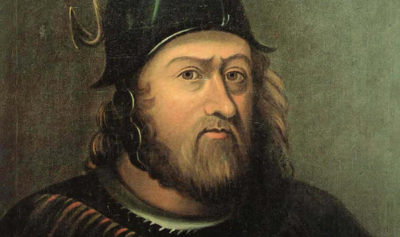 In 1320 at Arbroath Abbey, Scotland declared independence or perhaps more accurately, reasserted its independence.
In 1320 at Arbroath Abbey, Scotland declared independence or perhaps more accurately, reasserted its independence.
Signed by 51 nobles, and accompanied by a letter from King Robert I, the epistles, written in Latin to the Pope, declared that the English king has unjustly attacked Scotland and had been defeated by Robert the Bruce. The nobles stated that if Robert could not continue to secure the liberty of the Scottish people, he would be replaced.
In the most enduring phrase of that remarkable pronouncement, the leaders of Scotland declared that for… as long as but a hundred of us remain alive, never will we on any conditions be brought under English rule. It is in truth not for glory, nor riches, nor honours that we are fighting, but for freedom — for that alone, which no honest man gives up but with life itself. The truth of the matter had already been proven for the past 40 years.
Edward I (“Longshanks”) of England was a renowned warrior king, crusader and “reformer,” who is credited by historians with establishing Parliament as a permanent institution. He also expelled the Jews from England, a banishment that lasted for 350 years until Oliver Cromwell. Additionally, Edward conquered Wales and Scotland.
Taking the opportunity to arbitrate a succession controversy in Scotland, Edward I proclaimed himself king and backed it up with English troops, defeating the Scots at Berwick on Tweed and Dunbar. After crushing resistance in various quarters, and receiving the submission of many of the almost 2,000 nobles of Scotland, Edward reacted to two leaders of warrior bands who joined forces to resist further compromise and strike a blow for Scotland.
Awaken Your Child’s Love of Learning, History And Adventure With The REAL Story of William Wallace!
On September 11, 1297, William Wallace and Robert Moray led their Scottish followers against the army of Edward I at Stirling. Although mystery still surrounds some of the details of the battle, the success of the Scot’s spear-carrying schiltrons and the stunning rout of the English army are not in doubt. Wallace and Moray assumed the title of Guardians of the Kingdom of Scotland and Wallace received a Scottish knighthood.
After a Scots raid into northern England, Edward responded with another invasion, himself at the head. The English archers, crossbowmen and cavalry routed Wallace’s forces at Falkirk, and many recalcitrant Scottish nobles were brought back into submission. Some historians believe Wallace escaped to France for a few years but returned in 1304. Betrayed to the English, he was tried in London, drawn and quartered, defiant to the last.
Guardianship of Scotland had passed to Robert Bruce after Falkirk, and he proceeded to battle and defeat fellow noble rivals to the monarchy of Scotland. Robert the Bruce seized the throne of Scotland at Scone in 1306 and served as king until his death in 1329.
The army of Edward II met King Robert at Bannockburn, 700 years ago, in one of the greatest battles in the history of Scotland. In the late afternoon before the battle, King Robert providentially met in single combat the impetuous knight Henry de Bohun and killed him with an axe blow to the head. The following day, the Scots repulsed an English attack and on the second day crushed the English cavalry after an ill-advised and impetuous charge. Edward returned to England and the Scots again celebrated their independence.
In September 2014, Scotland faces the possibility of independence once again. They do not have to draw up the schiltrons and face down a heavy cavalry charge of English knights. Their independence opponents are big business, banks, The Labour Party, The Conservative Party, the Liberal Democrats, Prime Minister Cameron and the Queen, not to mention the EU. The biggest supporters for independence are The Scottish National Party, The Scottish Green Party and the Scottish Socialist Party along with a variety of small groups all with different agendas for Scotland.
Some believe that Scottish secession would start a domino effect around the world, perhaps including the Republic of Texas and Republic of Vermont? At the least it would contribute to decentralization of the UK and force Scotland to pay for its own welfare system. Others think that independence would precipitate a crisis in England, leading to the downfall of the Cameron government or England’s withdrawal from the European Union.
The democratic impulse of our times has finally created a nice crisis worth watching, though I would still much prefer to see Robert the Bruce cross lances with Henry de Bohun or William Wallace chop down the front line of the heavy cavalry. Fighting and dying for liberty isn’t what it used to be. Liberty isn’t what it used to be, either, although it would be worth fighting and dying for. “Social democracy” is a foolish and deadly force that should be killed, but we won’t see that on September 18 whatever the outcome of the vote.
You can watch an excellent short but remarkable documentary about the origins of Scottish Freedom by visiting InFreedomsCause.com.
 Off The Grid News Better Ideas For Off The Grid Living
Off The Grid News Better Ideas For Off The Grid Living

